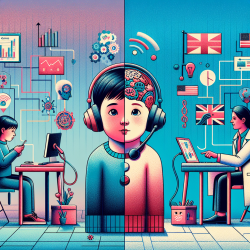As a practitioner in the field of speech-language pathology, your primary goal is to foster the best possible outcomes for children. One innovative approach that has shown promising results is the Samurai School Program, as detailed in the research article "Fit for School: The Samurai School Program" by Wernicke and Kalbantner-Wernicke (2016). This blog will explore how you can integrate the findings from this research into your practice to improve the developmental skills of children.
The Samurai School Program: An Overview
The Samurai School Program is designed to address developmental delays in children, particularly focusing on improving posture, concentration, and social behaviors. This program has been successfully implemented in various schools across Europe and has recently gained traction in the United States. It employs physical activities and exercises rooted in traditional Japanese practices to enhance proprioception, perception, and social competences among children aged 6-12.
Key Components of the Samurai School Program
The program is built around three core modules:
- Treatment Sequence of Samurai Shiatsu: A simplified version of Japanese Shiatsu tailored for children, focusing on respectful touch and physical interaction.
- Exercises: Activities designed to improve body awareness, concentration, and social interaction.
- Cultural Education: Introducing children to Japanese culture, which fosters curiosity and respect for diversity.
Implementing the Program in Your Practice
Here are some actionable steps you can take to incorporate the Samurai School Program into your practice:
- Start with Training: Begin by training yourself and your team in the basic principles of Samurai Shiatsu. This involves understanding the meridian systems and how they relate to child development.
- Introduce the Program Gradually: Start with short sessions, gradually increasing the duration as children become more comfortable with the exercises.
- Focus on Respectful Interaction: Emphasize the importance of asking for permission before physical contact, which teaches children about personal boundaries and respect.
- Monitor Progress: Keep track of each child's progress through regular assessments and adjust the program as needed.
Benefits Observed
Preliminary research and observations have shown several benefits of the Samurai School Program, including:
- Improved posture and physical awareness
- Enhanced concentration and attention spans
- Better social interactions and reduced incidences of violent behavior
- Increased self-efficacy and confidence
Encouraging Further Research
While the initial results are promising, more research is needed to fully understand the long-term impacts of the Samurai School Program. As a practitioner, you can contribute to this body of knowledge by documenting your observations and sharing them with the wider academic community.
To read the original research paper, please follow this link: Fit for School: The Samurai School Program.










